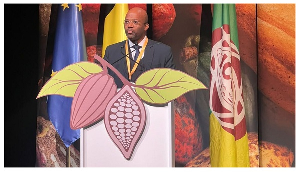 Alex Asanvo, Executive Secretary for Cote d'Ivoire Ghana Cocoa Initiative (CGCI)
Alex Asanvo, Executive Secretary for Cote d'Ivoire Ghana Cocoa Initiative (CGCI)
The Executive Secretary for Cote d'Ivoire Ghana Cocoa Initiative (CGCI), Mr. Alex Asanvo, has taken on global cocoa marketing giants for refusing to pay realistic prices for farmers and producing producers.
During a panel discussion at the ongoing World Cocoa Conference in Brussels, Mr. Asanvo questioned why buyers of the commodity have over the years failed to truly live up to their billing by paying actual prevailing prices often quoted by global news cables.
The Executive Secretary of the CGCI is of the view that global cocoa buyers have always exploited the market to their benefits, a development he believes always leaves farmers and producing countries at the bottom of an inequitable trade regime.
In the midst of the increasing prices of cocoa on the global market, farmers and civil society groups in producing countries are making a strong demand on buyers to apply the $10,000 dollars as the basis for payment to reflect current trends.
The demand, in the view of Mr Assanvo is one that is putting pressure on governments in terms of domestic pricing but which is not reflecting on the market.
“Today, all the global news cables are quoting $10,000 Dollars as price for cocoa on the international markets; this has put pressure on governments of producing countries as farmers and civil society groups push for local prices to be set at prevailing figures on the international markets but let’s ask ourselves if buyers are willing to pay same” Mr. Asanvo observed as he joined panelists on Monday to discuss the topic “The quest for the living income of smallholder farmers: why are we stuck and how can we fix it?”
According to Mr. Asanvo there are excessive demands from buyers on producing countries without commensurate actions from the market players themselves, stressing that there is lack of trust, consistency and stability in all facets of arrangements amongst the various key stakeholders in the global cocoa value chain which have over the year impinged effective implementation of policies and programmes, including the Living Income Differentials (LID) for the benefit of farmers.
Whilst touting the significant progress made in the strong advocacy for a living income for farmers, which in the last five years assumed a front seat in global discussion resulting in the introduction of the LID, the CGCI Executive Director said more needed to be done to actualize an ideal compensation for the toil and sweat of farmers.
“We all know, that from whatever position we’re seeing it from, we owe farmers a living income. We cannot shun our responsibilities and capabilities – because we know we can make it. So yes, things have changed tremendously, hence my nuance on “why we are stuck”. We are not stuck. We are in a dynamic process. The peripherical idea of a living income for farmers – has come to the center of the conversation. And this panel is illustrative of that” he emphasized.
On the question of whether the LID has failed its intended purpose or not, Mr. Asanvo likened the policy to pointing to a moon and actually reaching it, arguing on the affirmative that despite the criticisms, "the circumvention and the weaknesses encountered as a results of origin differential downsides, the policy has still survived and continues to target a floor price to enable farmers get a living income”
According to Mr. Asanvo, in order to engender trust, there is the need for accountability and transparency from all stakeholders, this he argues, were being done by producing countries through constant publication of the average achieved forward sale price and building a traceability system where not only volumes, but prices will be traced.
He contends that like producing countries, the companies must also be more accountable and transparent as well.
“This, they can do Disclosing how much they source at country level every year; how many farmers are in their sustainability programmes and how much they’re earning. We need some data to get to the moon. What cannot be measured cannot be fixed”. he said.
The Executive Director of the CGCI also advocated for consistency on issues of sustainability, stressing that living income should be mainstreamed across the sustainability regulations of exporting and importing countries.
According to him, sustainability voluntary programs should reward farmers with a living income or living income price, since the issue of sustainable cocoa cannot be attained without paying farmers a living income.
Mr. Asanvo advocated for a stable and predictable market forces to help shape expectations towards an ambitious plan that guarantees a living income for farmers, asserting that “producing need a predictable floor price, with a dedicated mechanism to deliver it irrespective of terminal market prices since history shows that commodity markets are prone to price falls as sudden as price rises – and sadly for farmers, falls are way longer than rises.”